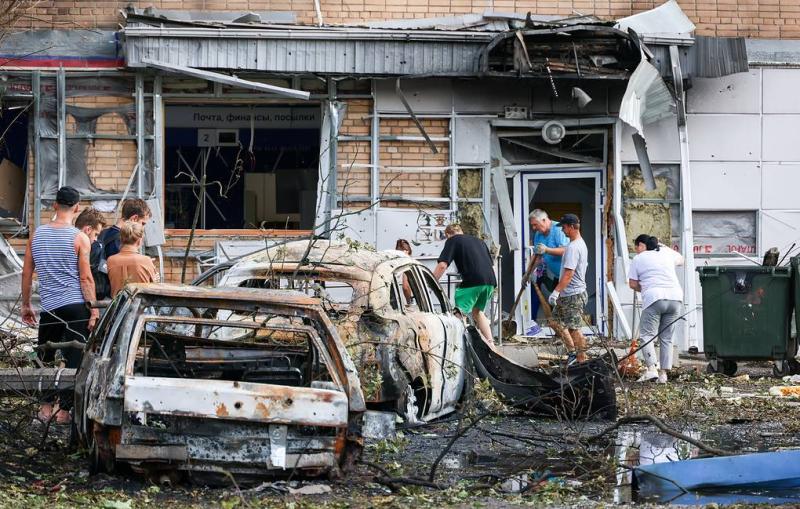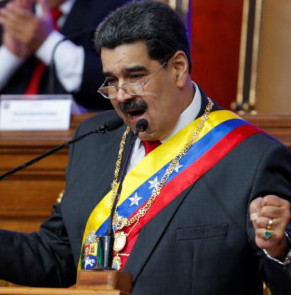
Fighting continues in Russia’s Kursk Region, forcing Belarus to send reinforcements to the border with Ukraine; BRICS members and other countries announce plans to attend the group’s summit in Russia; and protesters rally against lithium mining in Serbia. These stories topped Monday’s newspaper headlines across Russia, according to TASS News Agency.
Vedomosti: Fighting continues in Russia’s Kursk Region
It’s been almost a week since the onset of the Ukrainian army’s attack on Russia’s Kursk Region. According to Russian data, the enemy has lost up to 1,350 troops and heavy equipment so far. Moscow has announced a counterterrorism operation in three regions of the country, those being Bryansk, Belgorod and Kursk. Over 76,000 civilians have been evacuated from border areas in the Kursk Region, Vedomosti writes.
The Ukrainian army’s attacks on Russian regions will not affect Brussels’ support for Kiev, the European Union’s foreign policy spokesperson Peter Stano said. Meanwhile, the US has been in no hurry to react to the situation and even admitted that it doesn’t fully understand Kiev’s goals. The silence of US politicians makes it clear that Ukraine’s incursion has put the Biden administration in an awkward position, Andrey Kortunov, research director at the Russian International Affairs Council, pointed out. The expert explains that the current developments mark a highly escalatory step by Ukraine. "The US understands that it’s getting closer and closer to a red line. Washington is concerned that the issue of assistance to Kiev may move beyond funding, affecting US national security," Kortunov said.
In the meantime, Belarusian President Alexander Lukashenko is sending reinforcements to the border with Ukraine, spurred by Kiev's actions to take the conflict to another level. Lukashenko’s decision is further proof of his country’s allied relations with Russia, Center for Analysis of Strategies and Technologies Director Ruslan Pukhov told Vedomosti.
The deployment of additional Belarusian troops to the Ukrainian border will not necessarily lead to an immediate escalation, Nikolay Mezhevich, head of the Center for Belarusian Studies at the Russian Academy of Sciences’ Institute of Europe, said. However, Minsk is not convinced that Ukraine will exercise common sense and refrain from sparking a conflict with Belarus, too. The measures that Minsk has taken to strengthen the border are based on the principle of "reasonable sufficiency," Vyacheslav Sutyrin, director of the Center for Science Diplomacy and Promising Academic Initiatives at Moscow State Institute of International Relations’ Institute for International Studies, stressed. The Belarusian leadership wants to show that it remains on its toes, seeking to avoid an escalation of tensions. Minsk is ready to defend itself but also to de-escalate the situation on the border, particularly through political means, the expert concluded.
Izvestia: Countries confirm plans to attend Russia-hosted BRICS summit
Brazilian President Luiz Inacio Lula da Silva plans to attend the BRICS group’s summit in the Russian city of Kazan, even though his visit has not been confirmed officially yet, a Brazilian embassy official told Izvestia. South Africa has confirmed plans to attend the summit, with President Cyril Ramaphosa leading the country’s delegation. The presidents of Bolivia and Venezuela have also been invited. Nicaragua, too, plans to send a representative to the summit, the government said. Nicaragua is not a BRICS member, but it is interested in cooperation with the group. In total, some 30 countries have expressed a wish to join BRICS.
Laying down a joint payment mechanism will be a key discussion topic at the summit, which is going to be the final event of Russia’s BRICS Presidency, said Viktoria Panova, who heads an expert council tasked with overseeing Russia’s presidency. "Active efforts are underway to create a financial payment mechanism that would make cooperation between BRICS countries easier, maintaining their sovereign trade and economic exchanges. This issue tops the agenda because every member of the group sees it as important," the expert said.
News came in late July that BRICS nations had developed a system similar to the Society for Worldwide Interbank Financial Telecommunication (SWIFT), from which Russia had been disconnected after the launch of its special military operation in Ukraine. The mechanism will operate on the basis of the BRICS Bridge supranational payment platform. Payments will be conducted in the national currencies of BRICS countries, while the New Development Bank will act as a platform for integration, conversion and clearing. That said, it’s also important to discuss ways for new BRICS members to interact with the New Development Bank, Panova added.
Other issues that are expected to be touched upon at the summit include regional conflicts and counterterrorism, the expert went on to say. "BRICS has established itself as a comprehensive mechanism for political cooperation. All of the group’s countries are responsible members of the international community, which is why we are concerned not only about the conflicts taking place in Eurasia but also about what is happening in the Middle East and other parts of the world," Panova noted.
Media: Protesters rally against lithium mining in Serbia
The protests against lithium mining that took place in the Serbian capital of Belgrade on August 10 were supposed to precipitate a color revolution, Ivica Dacic, the country’s deputy prime minister and interior minister, said. Serbian President Aleksandar Vucic earlier spoke about preparations for mass riots aimed at conducting a coup. According to him, Belgrade was tipped off to the situation by Russia, Vedomosti notes.
A series of protests began in Serbia in late July, sparked by the government’s decision to restore the British-Australian mining company Rio Tinto Group's license to develop Europe’s largest lithium deposit, worth an estimated $2.4 bln. The license was suspended in 2022 under pressure from environmental activists, who argued that the environmental costs of lithium mining outweighed the project's potential economic benefits. However, in mid-July, Vucic and the European Union’s authorities signed a memorandum of understanding, focusing on raw materials including lithium.
Serbian demonstrators are protesting against the neo-colonial practice of exploiting the natural resources of peripheral countries, Anastasia Maleshevich, researcher with the Institute for International Studies at Moscow State Institute of International Relations, pointed out. In her opinion, the environmental risks related to mining Rio Tinto are very high, while the West is clearly lobbying for the project: "Its implementation is literally being linked to talks on Belgrade’s accession to the EU." According to Maleshevich, President Vucic has found himself in a situation where he actually cannot directly say no to his Western partners. However, he can use his people’s discontent in order to reduce external political pressure.
Meanwhile, although Vucic has pointed to "the threat of a color revolution" in relation to the protests, the current situation is lacking the key feature of a color revolution, that being Western backing of the protests, Nezavisimaya Gazeta notes. This is easy to explain: the rallies are actually aimed at undermining a project that the European Union needs. In fact, the Rio Tinto project is directed against Moscow and Beijing. Russia has rather large undeveloped lithium reserves, while China is the global leader in lithium processing. So the West will not support the protests, unless the Serbian president goes too far in dispersing the demonstrators, an unlikely scenario.
Vedomosti: Iran unlikely to change course after forming new government
Iranian President Masoud Pezeshkian has submitted a list of 19 candidates for government posts to the country’s parliament. In addition, he has established the position of strategic advisor to the president, Vedomosti notes.
Pezeshkian has nominated Strategic Council on Foreign Relations Secretary Abbas Araghchi for foreign minister. Araghchi served as deputy foreign minister in 2017-21 and led Iran’s delegation in talks on the nuclear deal. Deputy Chief of Staff of the Iranian Armed Forces Aziz Nasirzadeh, who used to command the Air Force, has been nominated for defense minister. Both Araghchi and Nasirzadeh earlier visited Russia.
Vladimir Sazhin, senior researcher at the Russian Academy of Sciences’ Institute of Oriental Studies, points out that "what Pezeshkian has proposed is by no means final because as with previous governments, parliament never approves every candidate." The expert does not rule out that part of the new cabinet will be made up of Pezeshkian’s liberally-oriented supporters, while the other part will consist of conservative politicians close to Supreme Leader Ayatollah Ali Khamenei.
However, Sazhin notes that Iran’s government cannot pursue an independent policy as its main job is to achieve the economic goals set out by Khamenei, meaning there will be no fundamental change in the country’s policy. "Still, the appointment of a new top diplomat may lead to efforts to resume dialogue with the US, restore trade and economic ties with the European Union and launch the process of resolving the issue of sanctions," Sazhin stressed.
The ministerial candidates proposed by Pezeshkian can generally be described as reformers, but any dissenters will be tossed aside in the approval process, said Yevdokia Dobreva, senior laboratory researcher with the Center for Middle East Studies at the Russian Academy of Sciences’ Institute of World Economy and International Relations. She points out that Washington is unlikely to change its stance on Tehran, while Iran will remain a de facto military and logistics partner for Russia, which eliminates any chance of sanctions being lifted.
Kommersant: Russia increases aluminum exports to Asia
Russia continues to increase aluminum exports to Asian countries, redirecting some of the supplies that used to go to the US and Europe. In particular, Moscow raised aluminum exports to South Korea by about 20% year-on-year in the first half of 2024, strengthening its position as one of Seoul’s top three suppliers, Kommersant notes.
According to the AlCircle website, South Korea recorded the world’s highest per capita demand for aluminum in 2023, which was driven by the needs of automobile and electrical companies.
The rise in aluminum supplies to South Korea is in line with the overall trend for the growing export of aluminum products to Asian countries. According to the Chinese customs service, Russia exported $1.5 bln worth of raw aluminum to China in the first five months of the year, which is more than half of last year’s total supplies.
A market source told the newspaper that the increase in aluminum exports to Asian nations makes it possible for Russia to redirect some of the supplies that it used to send to the US and Europe. The US introduced prohibitive duties on Russian aluminum in March 2023, while the US and the UK jointly banned the import of aluminum, copper and nickel from Russia in April 2024. The source says that although the EU has not banned Russian aluminum yet, Brussels keeps talking about abandoning its imports.
Russia’s Rusal producer exports most of its aluminum. In 2023, South Korea became the company’s second-largest foreign market in terms of revenue. Revenues from China rose 2.5-fold, while proceeds from the European and US markets dropped by 40%. Kommersant’s market source expects Russian aluminum exports to China to grow further based on Beijing’s friendly ties with Russia and the size of China’s market.
TASS is not responsible for the material quoted in these press reviews









